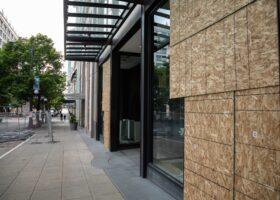Mayor Harrell’s historic opportunity to make Seattle safe again
February 23, 2022
For years the city of Seattle and other regional entities have tried – and failed – to reduce homelessness in their communities. We’ve argued that the reason for this is that they ignored or downplayed the primary causes – substance abuse and mental health issues – under the belief that housing availability or affordability is driving people onto the streets.
Mayor Bruce Harrell has vowed that this time, they’ll do it right. In his recent State of the City Address he called for a crackdown on petty crime often caused by the homeless, as well as the removal of encampments from parks and sidewalks. Although he also referenced additional mental health and drug addiction services, it’s important that the city not employ the same unsuccessful approach toward homelessness as before by focusing on more temporary housing.
Seattle needs a real plan for homelessness that gets them off the streets, treated, and either reintroduced to normal society or placed in permanent housing where they can receive proper care without endangering others or themselves.
Make Your Voice Heard on Homelessness!
Contact Mayor Harrell’s office and ask them what their plan is for reducing, not managing, the homeless population in Seattle.
It’s commendable that the city is finally acting to restore public access to public spaces by removing encampments that create not only health concerns but public safety ones as well. Harrell noted that the city has also at last created an online system for citizens to report encampment issues, which has received 1500 reports since he took office in January.
Clearly, the problem hasn’t gone away.
Although the mayor stated “we also urgently need more and better mental health and addiction treatment services and staffing for the providers and workers who deliver these services,” he has not yet provided any specific actions his Administration plans to take or any goals they hope to achieve in that area.
In contrast, he announced the city is already planning to pursue hundreds of millions of dollars in state and federal funding for housing. He also intends to work with the King County Regional Housing Authority (RHA), saying “strategies are in place that will lead to real, sustainable change.”
Harrell noted that “we remain wholly committed to avoiding the mistakes of the past,” and one can only hope that includes from prior regional efforts regarding homelessness.
It should be obvious to anyone Harrell did not cause this crisis but inherited it in a manner similar to a director taking on the latest movie in a film franchise that was once popular but most recently have been expensive box office bombs.
The most recent “films” have failed because they relied on a script that consisted primarily of building more transitional housing, buying hotels, and getting homeless into shelters as a solution to homelessness. It is shifting the problem to another part of the region at the cost of taxpayer dollars and continued public safety concerns in other places. The only people who benefit are the homeless who receive free housing and the entities paid to provide those services.
Harrell has a chance to restore the city’s “franchise” and in doing so become known as the mayor who made Seattle safe again.
But to do that, he’ll need a plan.
Restoring public safety by removing encampments and cracking down on crime is a good initial approach to preventing the growth of homelessness. But the only way to get the homelessness crisis under control is by attacking the sources. Those who are mentally ill to the point where they cannot care for themselves do not belong in an encampment or on the street, and temporary housing should merely be a stopgap until they are transferred to a permanent mental health facility. Those with drug and alcohol addictions should receive services so they can get clean, get their affairs in order, and reenter normal society. They should not be allowed to shoot up in comfort of free housing and in perpetuity while surrounded by activist-driven enablers.
In his speech Mayor Harrell said:
Public spaces are for everyone in our City. With many workers across our City returning to the office over the next several months, our focus must also ensure sidewalks are accessible to the public and clear of obstacles and obstructions. This is an essential obligation of our government, just like continued work to provide shelter, housing, services, and support for those experiencing homelessness.
However, it is imperative that whatever plan Harrell and other regional leaders implement, it does not allow the homeless who need it to refuse mental health or addiction services and yet continue to live off taxpayers or take up public spaces via encampments. We need to make it difficult and inconvenient for the homeless that don’t want help to remain in the region. That also frees up services to assist those that actually want to get out of their situation.
What’s the plan to make that happen?
If these services aren’t available or are insufficient, then they need to be created or expanded from their current capacities. But with funding and spending must come solid goals and a timeline to reach them if funding is to continue. It should not just become a source of revenue for private entities with no accountability for who gets the money or how that money is spent. No startup company ever got funding by refusing to explain to a potential investor what the return of investment might be.
We implore Mayor Harrell to turn a new chapter in the city’s history and make our communities safe and accessible to its citizens and small businesses. Seattle and the rest of the region needs a real plan to get the homeless off the streets permanently by addressing what got them there in the first place, without encouraging homeless from elsewhere to move there.
Contact Mayor Harrell’s office and ask him what’s his plan to reducing, not managing, the homeless population in Seattle.




